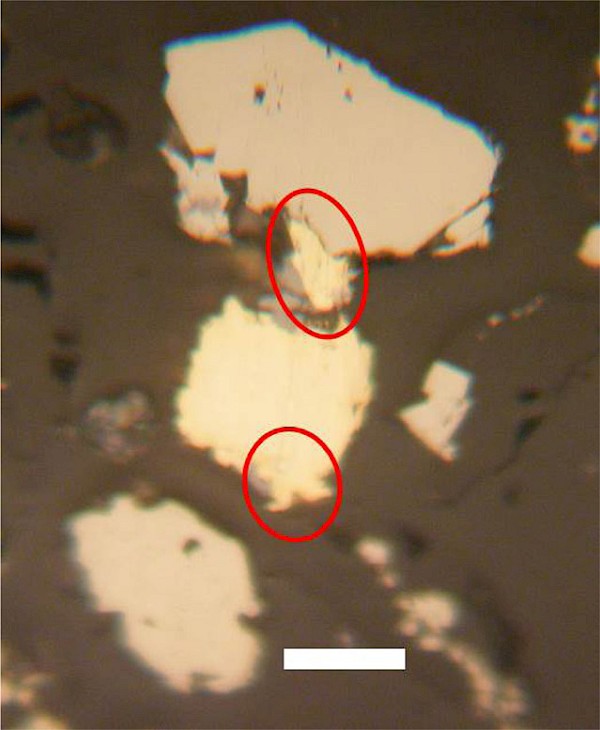Toronto, Canada (March 28, 2013) - Mammoth Resources Corp. (TSX-V: MTH) is pleased to report that gold observed from two core samples of un-oxidized hydrothermal breccia and an altered felsic volcanic selected for preliminary metallurgical test work occurred in as free gold associated with pyrite along pyrite grain fractures and on grain surfaces and that the rock in these samples was not oxidized. It is the opinion of Dr. Perez, who studied these samples that the gold is most likely leachable with cyanide and does not exhibit any major metallurgical complexities.
Mammoth President and CEO, Thomas Atkins, commented on the results from this work, stating: "We were curious as to the extent to which gold in the rocks hosting gold and silver mineralization at Tenoriba may occur in a free state either due to the host rocks being oxidized or that gold occurs would occur within fractures or on grain surface. This preliminary work has illustrated that gold at Tenoriba is indeed free and is the first step in determining whether Tenoriba mineralized rock may be processed using low operating and capital cost heap leach technology. Having received these encouraging results, it's now our intention to take a wider range of samples and perform bottle roll tests on this material to further confirm the material's potential cyanide leach characteristics. If the rocks continue to show cyanide leachable characteristics, we feel very encouraged by these results because of the large tonnage potential of mineralized rocks at Tenoriba given the current large, 15 square kilometre distribution of gold mineralization currently identified at Tenoriba."
Two representative core samples of less than 0.10 metres in length were selected from within intervals of hydrothermal breccia intersected in drill hole TDH -- 07 at an estimated vertical depth of 54.4 metres and an altered felsic volcanic intersected in drill hole TDH -- 11 at an estimated vertical depth of 160.9 metres. These samples were sent to Dr. Efren Perez at the University of Sonora in Mexico to study thin and polished sections of these samples to determine the extent to which these rocks were oxidized and the nature in which gold occurred in these samples (refer to Table 1 -- Description of Core Samples for Thin and Polished Section Analysis). These core samples are from longer core intervals previously sampled and assayed for gold and silver by Masuparia Gold Corp. (the company that drilled these diamond drill holes), and in which values for gold and silver were received (refer to Table 2 -- Summary Assay Results of Thin/Polished Section Samples).
The initial work performed by Dr. Efren consisted of a description of the rocks from these samples based on thin and polish section observations plus a review of these samples with a Scanning Electron Microscope with EDS (Energy Dispersive System). This initial work illustrated that the rocks from these samples had undergone hydrothermal alteration as described in Table 1. and were not oxidized. Gold was initially not observed within the sections cut from these samples. As a result of the inability to observe gold in the sections cut from the samples the samples were crushed and fire assayed to demonstrate the presence of gold in these sample intervals (refer to Table 2.). A heavy mineral concentrate was performed from this crushed material and further studied under a microscope (polish section). Gold was observed in sample # 3655 (refer to Image 1 - Occurrence of Free Gold Along Pyrite Grain Fracture and on Pyrite Grain Surface) and was observed to exist in a number of occasions as free gold associated with pyrite along fractures and on grain surfaces. No gold was observed in sample # 5165.
The general characteristic of the gold (free and along fractures and pyrite grain surfaces), the fire assay results illustrated in Table 2 and the lack of identifiable gold in sample number 5165 suggest a nugget effect to gold mineralization in the area sampled. It is the opinion of Dr. Perez that the gold is most likely leachable with cyanide and does not exhibit any major metallurgical complexities (note that this the cyanide-leachable opinion refers to the observed free gold and ultimately recovery percentages won't be known until laboratory testing is completed)..
Table 1. Description of Core Samples for Thin and Polished Section Analysis
| Drill Hole No. / Section Sample No. | From (metres) | To (metres) |
Length (metres) | Description | Estimated Vertical Depth (metres) |
Masuparia’s Original Sample Length / Original Assay Results |
|---|---|---|---|---|---|---|
| TDH - 07 / Sample no.3655 | 63.25 | 63.32 | 0.07 | Sulphide bearing (less than 5%) and silica flooded hydrothermal breccia. Sulphides consists of pyrite, marcasite, minor chalcopyrite and tetrahedrite-tenantite with less than 3% silver associated with the tetrahedrite. | 54.4 | From 62.8 to 64.7 metres / 1.9 metres grading 45.9 grams per tonne gold and 37.1 grams per tonne silver. |
| TDH - 11 / Sample no. 5165 | 185.85 | 185.95 | 0.10 | Sulphide bearing (less than 10%) silica, argillic and sericite altered felsic tuff with a quartz-carbonate stringer (less than 0.5 centimetres thick). Sulphides present are similar to the previous sample plus the addition of traces of galena and sphalerite. | 160.9 | From 185.8 to 186.1 metres / 0.3 metres grading 6.94 grams per tonne gold and 5.6 grams per tonne silver. |
Table 2. Summary Assay Results of Thin/Polished Section Samples
| Drill Hole No. / Section Sample No. | Original Gold Assay Result (g/t) |
Original Silver Assay Result (g/t) |
Gold Laboratorio Tecnolgico de Metalurgia Sample (g/t) |
Silver Laboratorio Tecnolgico de Metalurgia Sample (g/t) |
|---|---|---|---|---|
| TDH - 07 / Sample no. 3655 | 45.90 | 37.1 | 6.50 | <5.0 |
| TDH - 11 / Sample no. 5165 | 6.94 | 5.6 | 5.01 | <5.0 |
About Mammoth Resources:
Mammoth Resources (TSX-V: MTH) is a mineral exploration company focused on acquiring and defining precious metal resources in Mexico and other attractive mining friendly jurisdictions in the Americas. The Company has an option to acquire 100% each in the Urique and the Tenoriba Properties, both of which are located in the Sierra Madre Precious Metal Belt in southwestern Chihuahua State, Mexico. The company continues to seek other option agreements in the Americas on other properties it deems to host above average potential for economic concentrations of precious metals mineralization.
Qualified Person / Quality Controls:
Richard Simpson, P. Geo., Vice-President Exploration for Mammoth Resources Corp. is Mammoth's Qualified Person, according to National Instrument 43-101 and is responsible for any technical data mentioned in this news release.
To find out more about Mammoth Resources and to sign up to receive future press releases, please visit the company's website at www.mammothresources.ca
Neither the TSX Venture Exchange nor its Regulation Services Provider (as that term is defined in the policies of the TSX Venture Exchange) accepts responsibility for the adequacy or accuracy of this release.
Forward Looking Information: This news release may contain or refer to forward-looking information. All information other than statements of historical fact that address activities, events or developments that the Company believes, expects or anticipates will or may occur in the future are forward-looking statements; examples include the listing of its shares on a stock exchange and establishing mineral resources. These forward-looking statements are subject to a variety of risks and uncertainties beyond the Company's ability to control or predict that may cause actual events or results to differ materially from those discussed in such forward-looking statements. Any forward-looking statement speaks only as of the date on which it is made and, except as may be required by applicable securities laws, the Company disclaims any intent or obligation to update any forward-looking statement, whether as a result of new information, future events or results or otherwise. Although the Company believes that the assumptions inherent in the forward-looking statements are reasonable, forward-looking statements are not guarantees of future performance and, accordingly, undue reliance should not be placed on these forward-looking statements due to the inherent uncertainty therein.
For further information please contact:
Thomas Atkins
President & CEO
tom@mammothresources.ca
Image 1 - Occurrence of Free Gold Along Pyrite Grain Fracture and on Pyrite Grain Surface (gold grains are inside red circles, white scale bar equals 0.05 milimetres)

